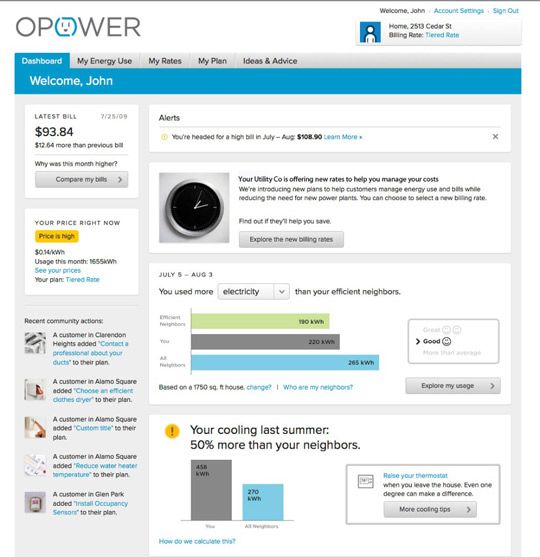Green fervor, for both types of green -- cash and environment -- has spawned a crowd of smart grid and energy efficiency startups: some viable and successful, many undifferentiated, most doomed.
With more than $30 million in revenue, OPower easily falls into the viable category. The startup, funded by New Enterprise Associates and MHS Capital, has created a new type of energy business with growing momentum.
OPower is an energy efficiency company focused on customer engagement and behavior modification, currently providing millions of homes with in-home energy data and efficiency advice via paper reports or online. The platform is described as advanced customer engagement and the firm says that about 85 percent of its customers will cut power consumption by around 3.5 percent. The customized data lets people know how much energy they're using in comparison to their neighbors and then follows it up with a recommended course of action.
"One fundamental observation about OPower," said Ogi Kavazovic, the firm's Senior Director of Marketing and Strategy, is that the firm is "an energy-efficiency company as opposed to a smart grid company." He added, "The smart grid is wonderful, but it's important to remember that the ultimate goal is energy efficiency. Once the smart grid update is done, that will become the new normal, but energy efficiency will continue to be the goal."
At a recent VLAB event at Stanford University, OPower's CEO, Dan Yates, said that the company's revenue was on track for more than $30 million this year. He summed up OPower's business in this manner: "We provide information services to consumers through utility partners." He also said, "Energy efficiency is super boring. No one cares about it," and continued: "You have to push the info, no one is going to pull it. You have to deliver outcomes, not just deliver raw data." And in his words, that means that "web portals and in-home displays are not delivering value."
"We have cracked the nut in motivating consumers," said Yates. The rapidly growing startup works with utilities to "suck in their meter and billing data" and match that info with demographics, GIS data and weather data. Without having any devices in the home, OPower can disaggregate the data, parsing, say, heating from cooling, and provide analysis and actionable recommendations to the consumer to lower their energy usage.
-
Where Will DOE’s Loan Program Make the Next Climate Tech Investments?
48
-
What the Frack Is Happening With Natural Gas Prices?
15
-
With an Energy Crisis Brewing, No Peak in Sight for Emissions
9
And here's a great statistic from the company: the firm is providing the equivalent of one-third of the U.S. solar industry's output in energy savings -- simply by sending out an actionable set of data once a month to utility customers.
The number of utilities working with OPower is now 37 and Kavazovic sees that accelerating over the next 18 months. According to Kavazovic, "We're closing deals with two utilities a month." Greentech Media's Katherine Tweed reported on OPower's contract with AEP Ohio here.
"There's so much dust in the air," according to Kavazovic, as the grid undergoes "the biggest infrastructure upgrade. But there's an even bigger story behind that dust."
According to Kavazovic, the energy efficiency mandates in this country are becoming more aggressive. There's more and more talk about devising a set of national standards. "It remains a $10 billion industry -- and it's not a one-time thing, but rather, an ongoing project."
Starting this year, OPower is guaranteeing the level of energy savings it can provide to customers. According to Kavazovic, "We'll deliver 300 gigawatt-hours at less than 5 cents per kilowatt-hour." That kind of number is applicable to a large utility.
Kavazovic sees OPower as the de facto front end of the smart grid, able to provide millions in savings for end customers and a clear value proposition for the consumer, something that's been a bit hard to define, despite all the smart-grid hype.
Ogi sums it up this way: "In a nutshell, what we've done is to figure out a way to engage a large proportion of a utility's customer base on a very boring subject, energy data."
And OPower has done it without any hardware in the home -- and in a way that lots of web portal and dashboard companies might consider a competitive challenge.
The firm has 105 employees with 40 or 50 job openings.
Examples of Opower's analysis and energy efficiency improvements:

